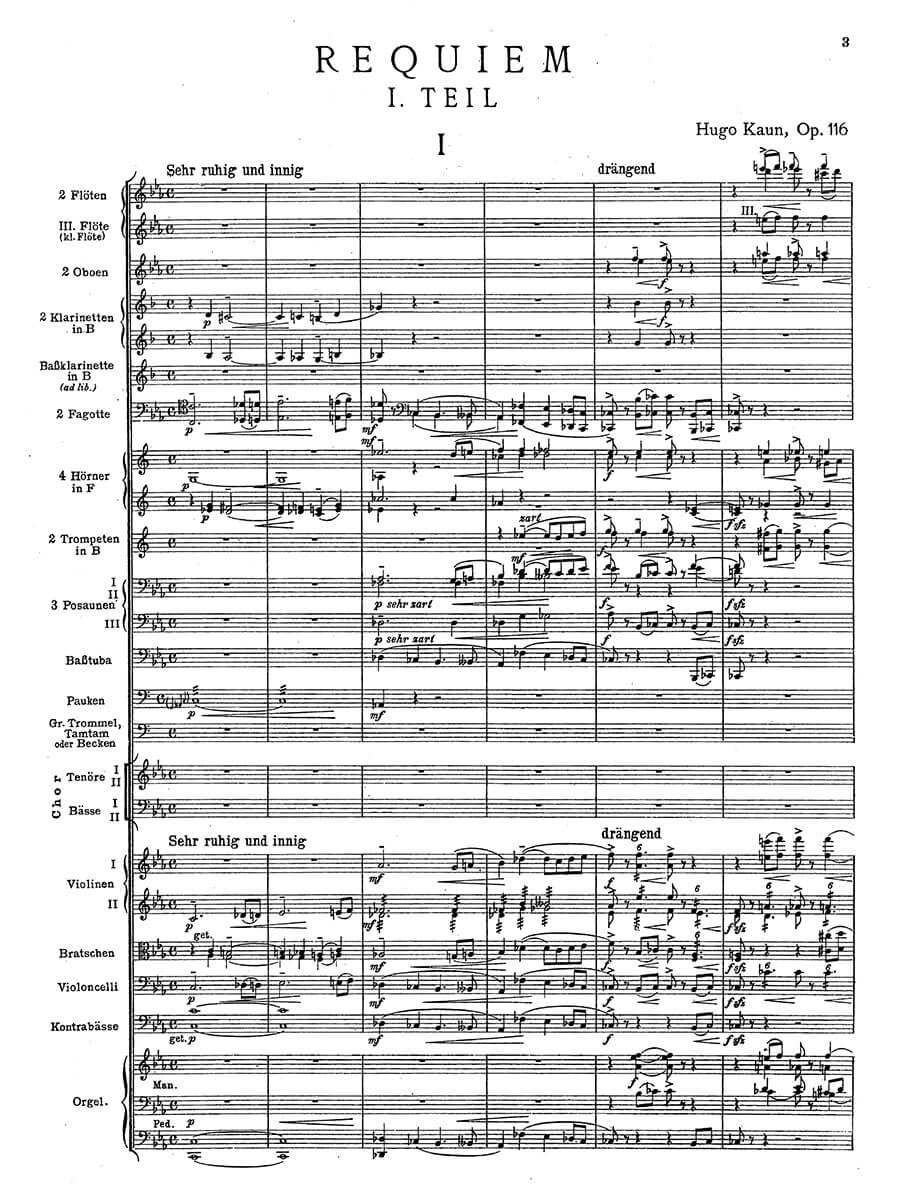Requiem in C minor Op. 116 for male choir, contralto solo (mezzo soprano) and orchestra (organ ad lib.)
Kaun, Hugo
29,00 €
Preface
Hugo Kaun – Requiem in C minor Op. 116 (1922)
(b. Berlin, 21 March 1863 – d. Berlin, 2 April 1932)
according to the Scriptures
for male choir, contralto solo (mezzo soprano) and orchestra (organ ad lib.)
Part I
I – ‚Alles, was aus der Erde kommt‘ (Everything that comes from the earth, p. 3)
II – ‚Herr, sieh an unsere Schmach‘ (Lord, look at our shame, p. 15)
III – ‚Alles ist eitel‘ (Everything is vain, p. 31)
IV – ‚Wie liegt die Stadt so wüste‘ (How is the city so desert, p. 34)
Part II
V – ‚Meine Zuversicht und meine Burg‘ (My confidence and my castle, p. 49)
VI – ‚Das ist ein köstlich Ding‘ (This is a good thing, p. 58) – ‚Denn der Herr ist groß‘ (For the Lord is great, p. 71)
VII – ‚O Tod, wie bitter bist du‘ (O death, how bitter are you, p. 81) – ‚Und Christus spricht‘ (And Christ speaks, p. 88)
Preface
Hugo Kaun from Berlin holds a special position in his generation – to which Richard Strauss, Pfitzner, Humperdinck, Mahler, Reznicek and Reger belong as well – which is mainly due to the fact that he emigrated to the USA in 1887, brought it to great acclaim in Milwaukee, the “most German city of the USA”, as the leader of an excellent male choir and sought-after teacher, and then returned to Berlin in 1900. In the autobiography ‘Aus meinem Leben’ (’From my Life’, Berlin, 1932), published in the last year of his life, from which all the following quotations are taken, Kaun tells: “Needless to say that this final decision cost me heavy, inner struggles, for in 13 years of pioneering work for German art I had acquired a name and a secure existence that was highly respected throughout the United States; after all, I had been offered many great positions over the years, but which I always rejected out of attachment to Milwaukee.“
Kaun was also a little off the beaten track in the sense that although he was initially regarded as a ‘musician of progress’, he was gradually perceived in progressive circles as rather moderate. After the First World War he finally was on the shelf and received occasional appreciation only from conservative circles. Among the masters of his generation he felt Pfitzner and Reger to be musically the closest to him.
Kaun grew up under economically uncertain circumstances: “The fact that I would become a musician was clear to me at the age of 13. I have to laugh when I think of the fact that at this age I had already written about 100 compositions, of course without any theoretical instruction.” At the age of 15 he became a pupil of the Friedrich-Kiel pupil Franz Neumann, who taught him the necessary craft in harmony, counterpoint and fugue within two years: “Neumann was undoubtedly a good musician and the usual conscientious teacher, but I also lacked what I would like to call ‘musical atmosphere’: he could only give me ‘routine lessons’”.
After a short intermezzo as a student at the Berlin Musikhochschule, he became a private piano pupil of the former Tausig pupil Oskar Raif (1847-99), where he made rapid progress, but a hand injury prevented him from further training. All the more intensively he turned to composition, where in 1880-83 Friedrich Kiel (1821-85) was his decisive mentor: “Under the guidance of this wonderful musician and man, the years of study became revelations, spiritual experiences for me. Kiel, a master of counterpoint and of formal shaping, based his feelings and thoughts on Bach and Beethoven, but without denying his own individuality, which consisted in his genuinely German, simple, but also pithy manner of expression. He was a true Westphalian. What he gave his pupils was not dry, theoretical thought work, but his own deep feeling: he gave us his soul!“
Kiel also adopted a mediating attitude in the then bitter dispute between Wagnerians and Brahmsians, for which Kaun was very grateful to him: “In my heart I was in this time of the most interesting musical battles a ‘Brahmin’, but I must confess that Wagner’s works, as far as I could hear them in the concert hall, always found enthusiastic resonance within me. […] I have never been able to understand why one has to revile someone one-sidedly so that (supposedly) someone else rises higher. It’s strange that my countrymen have to nag their greatest spirits the most”.
Read full preface > HERE
Score Data
| Edition | Repertoire Explorer |
|---|---|
| Genre | Choir/Voice & Orchestra |
| Size | 210 x 297 mm |
| Printing | Reprint |
| Pages | 108 |
